| Srl | Item |
| 1 |
ID:
133093
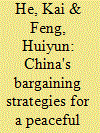

|
|
|
|
|
| Publication |
2014.
|
| Summary/Abstract |
Applying bargaining theory of international conflicts, we examine the successes and challenges of China's strategic choices in its ascent after the Cold War. We suggest that China needs to alleviate information and commitment problems in order to rise peacefully. Since 2008, China's "peaceful rise" strategy has faced serious challenges because of its "assertive turn" in diplomacy. We argue that China has not alleviated or settled these two problems successfully because of its ambiguous "core interest" diplomacy and undecided attitude regarding multilateral institutions in resolving the maritime disputes. China should engage in rule-based, institution building, such as a security community between China and ASEAN, to reinforce its peaceful rise commitments.
|
|
|
|
|
|
|
|
|
|
|
|
|
|
|
|
| 2 |
ID:
133090
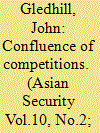

|
|
|
|
|
| Publication |
2014.
|
| Summary/Abstract |
In April 2006, riots broke out on the streets of Dili. As violence escalated over the weeks that followed, a beacon of liberal peace-building dissolved into near-anarchy. While there have been several accounts of Timor-Leste's "crisis" of 2006, it remains unclear why violence spiraled at that time, rather than at an earlier point in the country's post-conflict transition. This article addresses that temporal puzzle by combining an analysis of the structural origins of the crisis with discussion of proximate, agency-driven triggers to violence. The resulting narrative first details the development of competition between governing elites, and also between state security actors, over the years following independence. The fusion of those two dynamics of competition in 2006, I then argue, created conditions sufficient for violent conflict.
|
|
|
|
|
|
|
|
|
|
|
|
|
|
|
|
| 3 |
ID:
133094
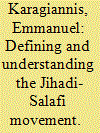

|
|
|
|
|
| Publication |
2014.
|
| Summary/Abstract |
Jihadi-Salafi groups have been on the march in the post-9/11 years on a violent campaign to achieve their ends. From North America to South-East Asia and from Europe to Sub-Saharan Africa, Jihadi-Salafis have attacked Western and local targets with often devastating results. Despite growing attention to the Jihadi-Salafi movement, which includes both globalized and localized components, there are still questions that remain largely unanswered. Three new books can shed light on this modern phenomenon that has preoccupied Western security policies for the past decade. Jihadi-Salafism is a large and diverse movement with a global reach that has embarked on an armed struggle to defend the imagined ummah.
|
|
|
|
|
|
|
|
|
|
|
|
|
|
|
|
| 4 |
ID:
133091
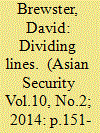

|
|
|
|
|
| Publication |
2014.
|
| Summary/Abstract |
Our mental maps of the world, including our perceptions of where regions begin and end, can have profound consequences on strategic behavior. For decades there has been a sharp division between what we understand to be the regions of South Asia and Southeast Asia. The line between them effectively cuts the Bay of Bengal in two. These perceptions have inhibited a proper analysis of the strategic dynamics of the area. This article argues that the Bay of Bengal increasingly matters as a strategic space. Like, the South China Sea, security issues in the Bay of Bengal and its littoral states need to be understood and addressed in a coherent manner.
|
|
|
|
|
|
|
|
|
|
|
|
|
|
|
|
| 5 |
ID:
133089
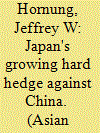

|
|
|
|
|
| Publication |
2014.
|
| Summary/Abstract |
As China accumulates more power, Japan is often overlooked as being capable of affecting China's continued trajectory because of material differences and narratives of Japan being a reactive state. Yet, Beijing's strategic planning cannot ignore Tokyo because Japan has the ability to affect the region's security environment. Feeling its presence and influence becoming relatively smaller, Tokyo has been increasingly proactive in its effort to expand its strategic space and shape the regional environment in ways conducive to its interests. A review of Japan's approach to China since 1972 reveals that it has shifted away from its traditional engagement policy toward first a soft hedge, followed by a harder hedge that continues to this day. Today's mix of partnerships and capabilities enable Japan to complicate China's freedom of action and frustrate its continued rise.
|
|
|
|
|
|
|
|
|
|
|
|
|
|
|
|